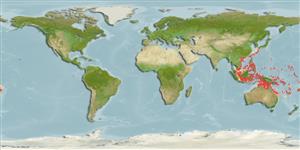Teleostei (teleosts) >
Callionymiformes (Dragonets) >
Callionymidae (Dragonets)
Etymology: Callionymus: Greek, kallion, comparative of kallos = beautiful + Greek, onyma = name; with a better name.
Eponymy: Frank J Keeley (1868–1949) worked at the department of mineralogy, Academy of Natural Sciences of Philadelphia. [...] (Ref. 128868), visit book page.
More on author: Fowler.
Environment: milieu / climate zone / depth range / distribution range
Ecology
Marine; demersal; depth range 2 - 70 m (Ref. 86942). Tropical
Western Central Pacific: Philippines and Papua New Guinea.
Size / Weight / Age
Maturity: Lm ? range ? - ? cm
Life cycle and mating behavior
Maturity | Reproduction | Spawning | Eggs | Fecundity | Larvae
Kailola, P.J., 1987. The fishes of Papua New Guinea: a revised and annotated checklist. Vol. II Scorpaenidae to Callionymidae. Research Bulletin No. 41, Research Section, Dept. of Fisheries and Marine Resources, Papua New Guinea. (Ref. 6192)
IUCN Red List Status (Ref. 130435: Version 2024-1)
Threat to humans
Harmless
Human uses
Tools
Special reports
Download XML
Internet sources
Estimates based on models
Preferred temperature (Ref.
123201): 24.2 - 28.9, mean 27.5 °C (based on 240 cells).
Phylogenetic diversity index (Ref.
82804): PD
50 = 0.5000 [Uniqueness, from 0.5 = low to 2.0 = high].
Bayesian length-weight: a=0.00891 (0.00410 - 0.01937), b=2.78 (2.60 - 2.96), in cm total length, based on LWR estimates for this Genus-body shape (Ref.
93245).
Trophic level (Ref.
69278): 3.3 ±0.4 se; based on size and trophs of closest relatives
Resilience (Ref.
120179): High, minimum population doubling time less than 15 months (Preliminary K or Fecundity.).
Fishing Vulnerability (Ref.
59153): Low vulnerability (10 of 100).
